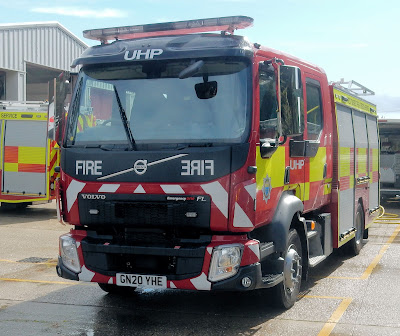Shocking display by Councillor Duncan Crow at County Council meeting
Last week, he was rightly challenged by Labour and Liberal Democrat County Councillors on the lowering of response standards. Their questions were both perceptive and accurate, but his responses showed that he did not like the Council's deception being exposed.
The reality is that Dr Walsh does 'get it' and Councillor Crow doesn't like it
False claim that a fire engine will arrive within 16 minutes
When Councillor Caroline Baxter asked a question about response times, Councillor Crow falsely claimed that the new standard meant that wherever you are in the County, you could "expect a fire engine to come to you in an emergency within 16 minutes.”
That is untrue, the new standard still allows fire engines to take more then 16 minutes to arrive at 10% of emergencies! The performance will still be deemed 'green' (satisfactory). Latest figures show that in the year to date the first fire engine took more than 16 minutes to arrive at:
9.54% of emergencies
In a full year that would be over 800 occasions when people in trouble had to wait over 16 minutes for any help to arrive
Firefighters always do their utmost to get to emergencies quickly, but their ability to do so is limited by the inadequate resources provided by the County Council.
Members of Parliament call for improvements
West Sussex MPs have also been highlighting the County Council's inadequate fire & rescue service provision.
Unlike Conservative MPs, who have routinely accepted whatever the Conservative controlled County Council tells them, two Liberal Democrat MPs have taken the time to visit West Sussex fire stations and listen to firefighter concerns.
Duncan Crow again disgraced himself by attacking Chichester's MP, Jess Brown-Fuller, after her visit to Chichester fire station. He attacked her in the press and then used a contrived question, from one of his Conservative colleagues, to try and discredit the MP's comments at the County Council meeting.
The MP correctly said that fire engines and equipment were out of date and in need of replacement. Duncan Crow falsely claimed that her statements were ‘not accurate’, ‘poorly informed’ and ‘baseless’. If he was more in touch with his responsibilities, then he would know that it is his claims that are ‘not accurate’, ‘poorly informed’ and ‘baseless’.
The County Council used to ensure that frontline fire engines were not more than 12 years old and special vehicles, dependent on type, were replaced between 15 and 20 years old.
So what would the MP have seen at Chichester Fire Station (if they weren't away for repair!):
Fire engine 1 - 11 years old
Fire engine 2 - 16 years old
Special vehicle 1 - 16 years old
Special vehicle 2 - 25 years old
Special vehicle 3 - 30 years old
Councillor Crow only has to read some of the County Council's own reports to know that Jess Brown-Fuller MP is correct.
Those reports state that "a well-managed replacement programme is essential as older vehicles require higher maintenance costs and present higher incidents of defects and failure rates." Yet, it is clear from a report this year that the replacement programme has not been managed well for the past seven years:



























